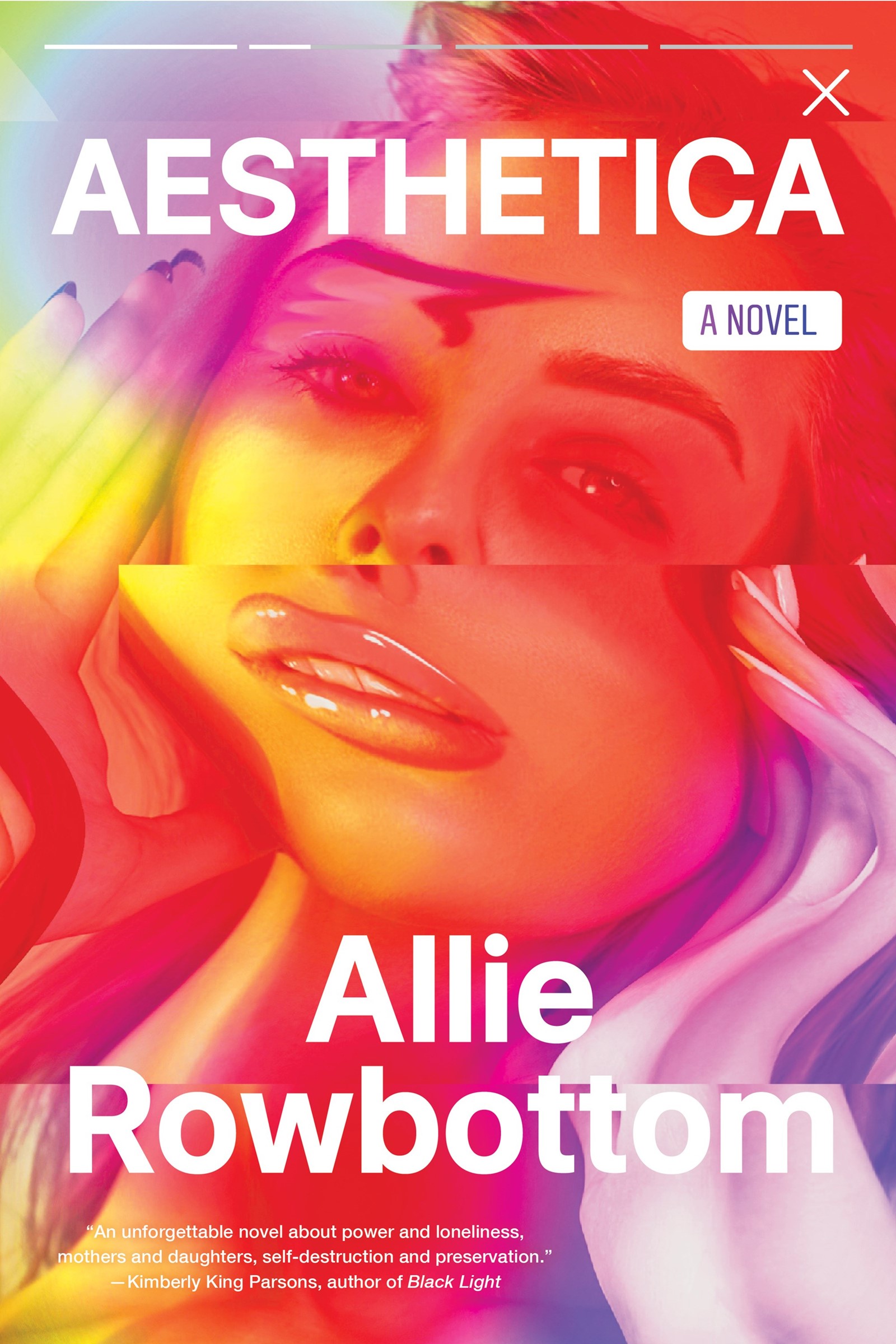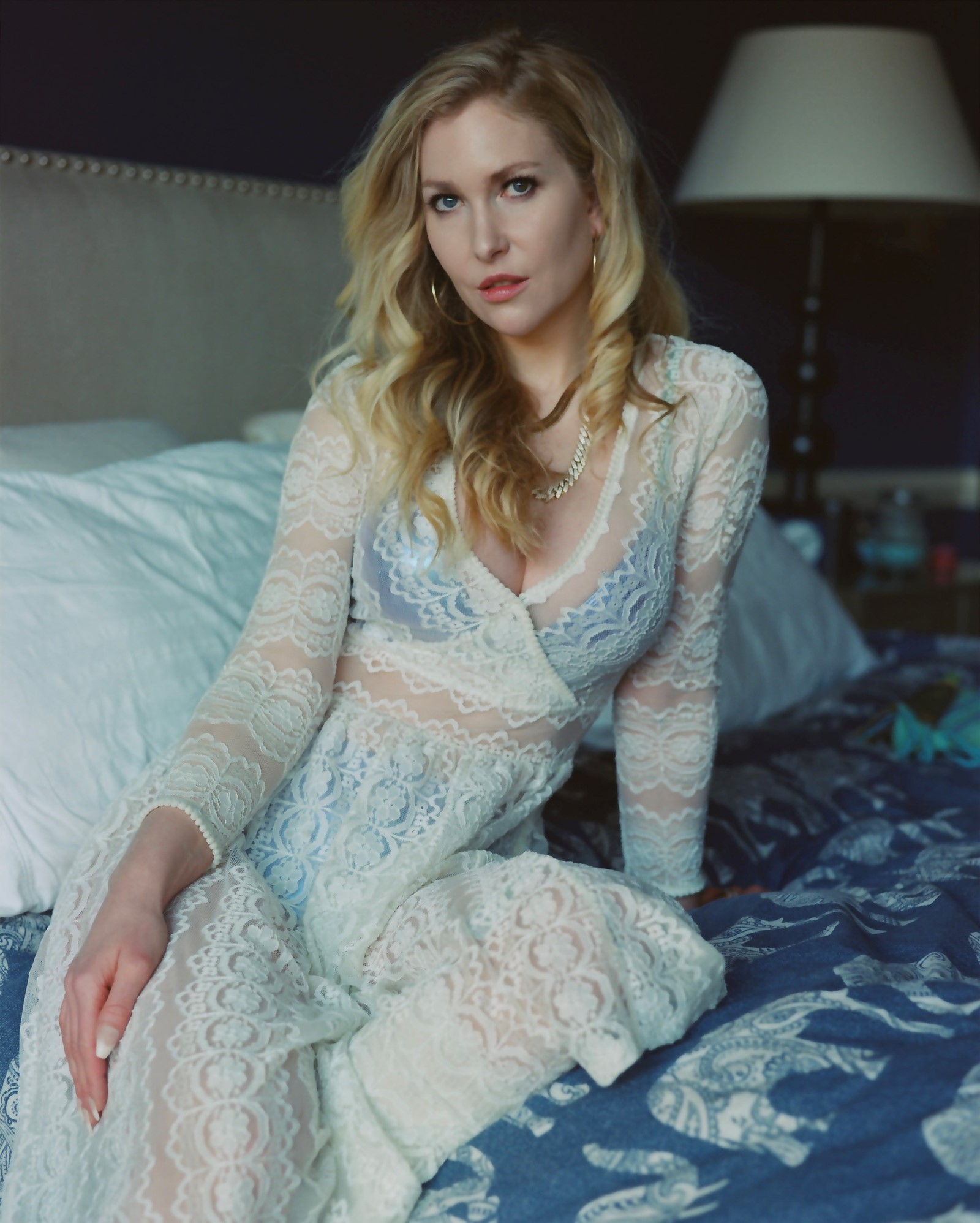Anna Wray (@annawray) is an influencer on the rise. Her fans adore her, her engagement is growing daily, and she’s soon to hit 100K followers. The year is 2017 and it’s the peak of Instagram, Kylie Jenner still has her lip fillers and the app hasn’t been destroyed by bots just yet. As she aims to boost her profile more and more, Anna finds that some cosmetic alterations go a long way in making her numbers rise.
Jump to 2032 and Anna, much wiser but not looking much older, is about to undergo an experimental surgery called Aesthetica which will see a complete reversal of all her previous procedures. It promises to restore her face to the state it would be in if she had allowed it to age naturally. Her fillers will be dissolved, her cheek and jaw implants removed, her rhinoplasties reversed, and a UV light will hyper-age her skin. It will be like Instagram never happened to her.
This is the story of Aesthetica, Allie Rowbottom’s searing and brilliant debut novel which delves into the horrifying and all too real world of influencer culture. AnOther caught up with Rowbottom over Zoom to discuss the novel, online feminism, and whether or not this is a horror story.

Barry Pierce: It’s so refreshing to read a novel that takes topics seriously, like the rise of influencers and the power of Instagram. How did you research the novel? Did you just spend hours scrolling through Instagram?
Allie Rowbottom: My research was a mix of things. Like anyone, I’ve spent a lot of time plugged into Instagram seemingly for no reason, and I feel like that obviously impacted the book. I also went to a lot of consultations with plastic surgeons, just to see inside the offices, get the vibe. Part of the reason why I wanted to write the book was that I was spending a lot of time on Instagram and [I was] feeling, like, really weird about it.
BP: You set part of the novel in 2017, which feels like a very specific and very purposeful year to choose. Why that year?
AR: At the time I was listening to a lot of Jeffrey Epstein and Harvey Weinstein podcasts and I wanted to set the book [to be] ever so slightly pre-#MeToo. I felt Jake [the abusive influencer who becomes Anna’s manager] is pulling so much crap that I felt if #MeToo had happened, Anna would have a little bit more vocabulary and agency to recognise his coercion. I also felt when I was working on Aesthetica the most in early 2020 that Instagram was getting to this weird place where it was starting to reach its final form, so I decided to go back in time to when it was at its most powerful.
“There are a lot of readers who are going to want to judge this character to other her or frame her as a dumb Instagram model” – Allie Rowbottom
BP: In 2017, Instagram felt like the Wild West; there were no rules, no regulations, normal people were becoming more famous than they ever should and, in hindsight, a lot of incredibly unethical things were happening. It felt like how reality television was in the 2000s.
AR: Yeah, that’s so true. There is also this idea of what is real and what is manufactured? A lot of those shows tread the line between real and fake, and on Instagram, that’s a real person’s body but it’s been altered in such a way.
BP: In Philippa Snow’s brilliant review of Aesthetica, she picked up on the fact that Anna subscribes to a very specific, very online brand of feminism whereby she uses phrases like ‘empowerment’ and sees the manipulation of her own body as something she is ultimately doing for herself.
AR: Yeah, someone recently mentioned to me a The Onion article from that era that was like, Everything Woman Does Is Empowering. [Laughs]. The thing is, sometimes surgeries can be empowering for certain people but it made total sense to me that this young girl, who wants the approval and wants to make it, would do some mental gymnastics to rationalise getting surgeries that she never thought she needed. I really wanted to get Anna to that place where she’s toying with the language of fourth-wave feminism because there are a lot of readers, especially readers of literary fiction, who are going to want to judge this character to other her, or frame her as a dumb Instagram model and having her somewhat versed in different schools of feminism felt like a way of bringing people in to this internal conflict a bit more and challenge their assumptions.
BP: In a lot of the press around the novel, the phrase ‘horror story’ comes up often. Was it your intention to write a horror story, or is it something that has been thrust upon the book?
AR: The latter. I don’t mind it at all, I kind of like it, but I didn’t set out to write a horror story. When I was writing it it felt very personal to me. I was putting so much of my own angst around aging, angst around plastic surgery and what I’ve chosen to do, what I chosen not to do, and grief. I wrote this novel on the heels of my mother’s death and a lot of the stuff that didn’t go into my first book [Rowbottom’s 2018 memoir Jell-O Girls] went into this book. It’s interesting that it’s seen as this horror story because so much of it is personal to me. But it doesn’t feel untrue, it feels like an apt term.
BP: When I read very online novels, I always start imagining this dude who lives in the woods who has no contact with the outside world, doesn’t have a phone, and then someone knocks on his door and hands him a copy of Aesthetica and he reads it. And I wonder, what is going on in his mind as he reads this book?
AR: Gosh, I don’t know, because when we were selling this book a couple editors who passed were like, I’m just not online enough for this book. And I don’t think you have to be that online to understand this book. Though the internet plays a large role in it I don’t think of it as an internet novel, there’s just so much emotion in it. And I hope for that reason the person in the woods would be able to connect to a lot of the book, even though they’re not online or on Instagram.
“I don’t think you have to be that online to understand this book, though the internet plays a large role” – Allie Rowbottom
BP: I have one final question: In the 2032 sections of the novel, Instagram is described as this dead platform, sort of in the same way that we think of Facebook now. What do you think will kill Instagram and is it something that will happen soon?
AR: I’m witnessing lately a lot of engagement going down and people are talking about that so I think it’ll be a long, slow death in that way. Also, I know now that if I’m looking for something, I’m not going to find it on Instagram. There’s just nothing rewarding coming from the app. And maybe people are feeling that there’s just nothing on there that’ll make them feel good. There’s also just so many scams, I just don’t have the energy. But if it does die then I can go do other stuff I guess. [Laughs].
Aesthetica by Allie Rowbottom is published by Soho Press and is out now.
